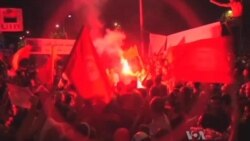LONDON —
Tunisia is facing political deadlock with the suspension of its legislature this week and large anti-government protests. Analysts say the crisis could further embolden Islamist extremists, who have killed 10 soldiers in the past few weeks.
On the surface, the impoverished Tunis suburb of Ettadamen looks like fertile ground for anti-government sentiments; buildings are crumbling, public services intermittent, unemployment is high and prices are rising fast.
Yet few here are calling for a second revolution. There is support for the ruling Islamist party Ennahda, and distrust of the opposition. Abdelaziz Jibali works in a mobile phone shop.
He says the opposition talked for years about freedom and democracy. But now, he says, they are wanting to overthrow their own principles and values that they of for years. He says they want to overthrow legitimacy just because the Islamists came to power.
But the Islamists’ opponents are equally determined. Ennahda’s coalition partner suspended the National Constituent Assembly this week - which was weeks away from finalizing the constitution.
The suspension came a day after tens of thousands took to the streets of Tunis calling for the downfall of the Ennahda-led government. Saleh was among them.
He says that the Tunisian people are protesting against the practices of Ennahda, the practices of what he calls a government of bribery and assassinations, which he says are "the practices of Ennahda.”
Many Ennahda opponents blame the party for the killing last month of opposition political leader Mohamed Brahmi - the second political assassination this year. Ennahda denies any involvement. A hardline Islamist has been arrested.
The past few weeks have seen a surge is Islamist militant attacks near the Algerian border.
That has fueled the opposition protests, and accusations that Ennahda is doing nothing to tackle extremist violence. But the same argument was used during the days of dictatorship, says Maha Azzam of policy institute Chatham House.
"It’s an old argument often put against the Islamists and also put forward by the military and authoritarian regimes - that security can only be protected by them,” he said.
The deadlock in Tunisia comes weeks after the military overthrow of Muslim Brotherhood President Mohamed Morsi in Egypt. Azzam says that has emboldened the opposition in Tunisia, but there are big risks for both countries.
“They are creating greater fissures in their society and giving greater strength to the arguments of those few extremists that were undermined by the democratic process, to say, ‘Well, democracy doesn’t deliver,’” he said.
The danger of Islamist terrorism is increasing, says Professor Alaya Allani, an expert on Islamist groups at Manouba University in Tunis.
“The Algerian authorities are deploying 16,000 personnel on their border with Tunisia,” said Allani. “It is a sign that these jihadists have become a social phenomenon, a phenomenon of terrorism that can threaten the stability and security in the entire North African region, not just Tunisia.”
Despite the political deadlock at home, Tunisia struck a deal this week to enhance security coordination with Algeria, to tackle militants along their mountainous border.
On the surface, the impoverished Tunis suburb of Ettadamen looks like fertile ground for anti-government sentiments; buildings are crumbling, public services intermittent, unemployment is high and prices are rising fast.
Yet few here are calling for a second revolution. There is support for the ruling Islamist party Ennahda, and distrust of the opposition. Abdelaziz Jibali works in a mobile phone shop.
He says the opposition talked for years about freedom and democracy. But now, he says, they are wanting to overthrow their own principles and values that they of for years. He says they want to overthrow legitimacy just because the Islamists came to power.
But the Islamists’ opponents are equally determined. Ennahda’s coalition partner suspended the National Constituent Assembly this week - which was weeks away from finalizing the constitution.
The suspension came a day after tens of thousands took to the streets of Tunis calling for the downfall of the Ennahda-led government. Saleh was among them.
He says that the Tunisian people are protesting against the practices of Ennahda, the practices of what he calls a government of bribery and assassinations, which he says are "the practices of Ennahda.”
Many Ennahda opponents blame the party for the killing last month of opposition political leader Mohamed Brahmi - the second political assassination this year. Ennahda denies any involvement. A hardline Islamist has been arrested.
The past few weeks have seen a surge is Islamist militant attacks near the Algerian border.
That has fueled the opposition protests, and accusations that Ennahda is doing nothing to tackle extremist violence. But the same argument was used during the days of dictatorship, says Maha Azzam of policy institute Chatham House.
"It’s an old argument often put against the Islamists and also put forward by the military and authoritarian regimes - that security can only be protected by them,” he said.
The deadlock in Tunisia comes weeks after the military overthrow of Muslim Brotherhood President Mohamed Morsi in Egypt. Azzam says that has emboldened the opposition in Tunisia, but there are big risks for both countries.
“They are creating greater fissures in their society and giving greater strength to the arguments of those few extremists that were undermined by the democratic process, to say, ‘Well, democracy doesn’t deliver,’” he said.
The danger of Islamist terrorism is increasing, says Professor Alaya Allani, an expert on Islamist groups at Manouba University in Tunis.
“The Algerian authorities are deploying 16,000 personnel on their border with Tunisia,” said Allani. “It is a sign that these jihadists have become a social phenomenon, a phenomenon of terrorism that can threaten the stability and security in the entire North African region, not just Tunisia.”
Despite the political deadlock at home, Tunisia struck a deal this week to enhance security coordination with Algeria, to tackle militants along their mountainous border.





